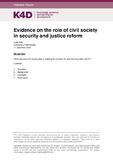| dc.contributor.author | Kelly, Luke | |
| dc.date.accessioned | 2022-03-31T10:30:16Z | |
| dc.date.available | 2022-03-31T10:30:16Z | |
| dc.date.issued | 2020-12-11 | |
| dc.identifier.citation | Kelly, L. (2020). Evidence on the role of civil society in security and justice reform. K4D Helpdesk Report. Brighton, UK: Institute of Development Studies. DOI: 10.19088/K4D.2022.031 | en |
| dc.identifier.uri | https://opendocs.ids.ac.uk/opendocs/handle/20.500.12413/17277 | |
| dc.description.abstract | This rapid review focuses on the role of civil society in SSR in several contexts. It finds that donor driven SSR is seen to have failed to include civil society, and that such efforts have been focused on training and equipping security forces. However, in some contexts, donors have been able to successfully develop civil society capacity or engage civil society groups in reforms, as in Sierra Leone.
There are also several examples of security and justice reforms undertaken by local popular movements as part of regime change, namely Ethiopia and South Africa. In other contexts, such as Indonesia, the role of civil society has led to partial successes from which lessons can be drawn.
The theoretical and empirical literature attributes several potential roles to civil society in SSR. These include making security and justice institutions accountable, mobilising a range of social groups for reform, publicising abuses and advocating for reform, offering technical expertise, and improving security-citizen relations. The literature also points to the inherent difficulties in implementing SSR, namely the entrenched nature of most security systems.
The literature emphasises that security sector reform is a political process, as authoritarian or predatory security systems are usually backed by powerful, skilled and tenacious vested interests. Dislodging them from power therefore requires significant political will – civil society can be one part of this.
The evidence base for the topic is relatively thin. While there is much literature on the theory of SSR from a donor perspective, there are fewer empirical studies. Moreover, scholars have identified relatively few successful examples of SSR. The role of civil society is found to be greater in more economically developed countries, meaning there is less discussion of the role of civil society in many African SSR contexts, for example (except to note its absence). In addition, most research discusses the role of civil society alongside that of other actors such as donors, security services or political elites, limiting analysis of the specific role of civil society. | en |
| dc.description.sponsorship | FCDO (Foreign, Commonwealth and Development Office) | en |
| dc.language.iso | en | en |
| dc.publisher | Institute of Development Studies | en |
| dc.relation.ispartofseries | K4D Helpdesk Report;862 | |
| dc.rights.uri | https://www.nationalarchives.gov.uk/doc/open-government-licence/version/3/ | en |
| dc.subject | Security and Conflict | en |
| dc.title | Evidence on the Role of Civil Society in Security and Justice Reform | en |
| dc.type | Helpdesk | en |
| dc.rights.holder | © Crown copyright 2020 | en |
| dc.identifier.doi | 10.19088/K4D.2022.031 | |
| dcterms.dateAccepted | 2020-12-11 | |
| rioxxterms.funder | Default funder | en |
| rioxxterms.identifier.project | K4D | en |
| rioxxterms.version | VoR | en |
| rioxxterms.versionofrecord | 10.19088/K4D.2022.031 | en |
| rioxxterms.funder.project | 0986883a-6d0f-4bb8-9c46-5e0682934d65 | en |

